|
|
|
Sort Order |
|
|
|
Items / Page
|
|
|
|
|
|
|
| Srl | Item |
| 1 |
ID:
143571
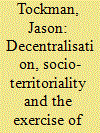

|
|
|
|
|
| Summary/Abstract |
This article analyses the ‘indigenous autonomy’ being constructed in two dozen Bolivian municipalities and territories, in accordance with the 2009 Constitution. It finds that Bolivia’s 1994 decentralisation reforms, which created the country’s system of municipalities, are central to understanding the contemporary implementation of indigenous autonomy. Some indigenous people view as favourable the representative and material gains achieved by municipalisation, which helps explain why more majority-indigenous communities have not yet chosen the new option of indigenous autonomy. However, the new legal framework also limits indigenous self-governance, because territorial delimitations of the country’s municipalities are generally inconsistent with indigenous peoples’ ancestral territories. The new institutions of self-governance are legally obligated to include discrete legislative, executive and administrative functions, reflecting not indigenous norms but a municipal structure of liberal design. This study illustrates the way that indigenous self-determination may encounter obstacles where indigenous territorial jurisdictions must coincide with contemporary boundaries of colonial origins, rather than with pre-colonial territories.
|
|
|
|
|
|
|
|
|
|
|
|
|
|
|
|
| 2 |
ID:
143568


|
|
|
|
|
| Summary/Abstract |
Recent geopolitical and economic changes have altered global social policy formation. The Bretton Woods multilateral development agencies (MDAs) have selectively incorporated ideas emerging from developing country states and decision makers, with a recent increased acceptance of social transfers as part of renewed efforts at poverty alleviation based on social risk management. There has been an instance in the use and promotion of conditional cash transfer (CCT) policies by MDAs. CCTs were a product of the emergence of a neo-structuralist welfare regime (understood as an ideal type) in Latin America – an attempt to reconcile neoliberal strategies of development with aspirations for guaranteed minimum incomes. The Bretton Woods and regional development bank MDAs have facilitated the adoption of CCTs in other developing countries, including the Phillipines. Here, a combination of actions by national political actors and MDAs has resulted in the implementation of a securitised and compliance-focused version of CCTs derived from the Colombian security state. Although poor Philippine households welcome income assistance, CCTs have acted to enforce further state monitoring without altering the national-based political and economic processes that replicate poverty.
|
|
|
|
|
|
|
|
|
|
|
|
|
|
|
|
| 3 |
ID:
143565
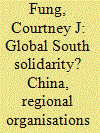

|
|
|
|
|
| Summary/Abstract |
Why was China responsive to regional organisations’ call for intervention in the case of the Libya crisis, where it supported sanctions and an International Criminal Court referral, and acquiesced to a no-fly zone, but unresponsive to pressure from regional organisations for intervention in the Syria crisis, issuing repeated vetoes instead? Using interviews and other primary data, this article explains the variation by highlighting that China is most responsive to regional organisations when these groups remain cohesive, congregate around the same policy position and when they publicly criticise or isolate China.
|
|
|
|
|
|
|
|
|
|
|
|
|
|
|
|
| 4 |
ID:
143566


|
|
|
|
|
| Summary/Abstract |
The so-called ‘nexus’ approach has recently been promoted as addressing externalities across the water, food and energy sectors, thus helping to achieve ‘water/energy/food security for all’, ‘equitable and sustainable growth’ and a ‘resilient and productive environment’. While these are noble goals, this article argues that the reality on the ground appears to be taking a different direction, at least when it comes to China and its neighbours in South and Southeast Asia. There, a new era of large-scale water infrastructure development is creating several security-related problems, which represent serious challenges to the nexus goals. These challenges include food–energy tensions, human security threats and ecological risks. These challenges can also be linked to rising friction surrounding the management of water, food and energy resources in the region. The article argues that, in order for the nexus goals to be achieved in China and the countries on its southern periphery, there must first be increased awareness of this nexus among policy-making elites.
|
|
|
|
|
|
|
|
|
|
|
|
|
|
|
|
| 5 |
ID:
143564
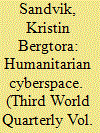

|
|
|
|
|
| Summary/Abstract |
In an effort to contribute to a more critical understanding of the role of information and communication technology (ICT) in humanitarian action, this article explores the topography of the ‘humanitarian cyberspace’ – a composite of ‘cyberspace’ and ‘humanitarian space’ – as it has emerged since the mid-1990s. The goals are to offer some observations about the conditions of the humanitarian cyberspace and to reflect on the relationship between the persistent features of humanitarian action and new developments brought on by ICT. The prism through which the role of ICT in humanitarian action is explored is that of the ‘shrinking humanitarian space’.
|
|
|
|
|
|
|
|
|
|
|
|
|
|
|
|
| 6 |
ID:
143570


|
|
|
|
|
| Summary/Abstract |
The disappointing performance of conventional public sector reforms in developing countries has led to the rise of ‘new’ approaches seeking to overcome traditional bureaucratic barriers to change: leadership-focused interventions like the Africa Governance Initiative (AGI); accountability-focused initiatives like the Open Government Partnership (OGP); and adaptation-focused models like those of Africa Power and Politics (APP). While these approaches are appealing to aid donors in their promise to move beyond the limitations of purely formal institution building, they fail to provide new answers to the ‘old’ analytical and practical challenges of public sector reform, in particular administrative patrimonialism, public corruption and political capture. The evidence is yet inchoate, but all points to the need for these approaches to work together with conventional ones. Beyond novel implementation tactics, however, there is a need for new strategies of sustained political support for embattled reformers who face powerful incentives against institutional change.
|
|
|
|
|
|
|
|
|
|
|
|
|
|
|
|
| 7 |
ID:
143569
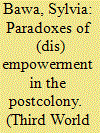

|
|
|
|
|
| Summary/Abstract |
Women’s empowerment discourses in Africa involve contradictory desires from women on one hand and society at large on the other. This article argues that the traditional validation mechanisms for women’s identities are crucial avenues for analysing both the conceptions and experiences of empowerment. Drawing on primary ethnographic data, I analyse paradoxes in women’s empowerment discourses in postcolonial Ghanaian societies, where neoliberal discourses thrive side-by-side with collectivist–socialist cultural ideals. Using an example of social capital, gained largely through mothering, I suggest that, because women’s relationships with capital are structured by local socio-cultural and global economic structures and relations, the theorisation and application of the concept of empowerment need to recognise the complicated relationships (with capital) that women negotiate on a daily basis.
|
|
|
|
|
|
|
|
|
|
|
|
|
|
|
|
| 8 |
ID:
143563


|
|
|
|
|
| Summary/Abstract |
Resilience’ has quickly risen to prominence in international security and development circles. In recent years it has found its way into political discourse on state building and state fragility, triggering a vast but often conceptually indistinct examination of the subject. Given its meaning in policy publications and guidelines, ‘resilience’ tends to eschew a static conceptualisation of statehood, turning instead to a more dynamic, complex and process-oriented rendering of state–society relations. This illustrates a conceptual shift from ‘failed states’ to ‘fragile states and situations’. It also transforms the concept of ‘failed state’ as a mere threat perception – with ‘stability’ as its logical other – into ‘fragility’ as a particular form of social and political risk. This paper analyses the concepts in 43 policy papers, focusing on the nexus of ‘resilience’ and ‘fragility’ in international state building, and assesses potential consequences. What does ‘resilience’ – as the opposite vision to ‘fragility’ – in fact mean? What is the practice derived from this chimerical state of states?
|
|
|
|
|
|
|
|
|
|
|
|
|
|
|
|
| 9 |
ID:
143567
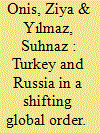

|
|
|
|
|
| Summary/Abstract |
The current global political economy is characterised by the intensifying economic interaction of BRICS and ‘near BRICS’ economies, with emerging powers increasing their influence in neighbouring regions. The growing partnership between Turkey and Russia constitutes a useful case study for examining this transformation, in which Western supremacy and US hegemony are under increasing challenge. Turkish–Russian relations shed light on broader themes in global political economy. First, significant economic interdependence may be generated among states with different political outlooks, in the form of loose regional integration schemes driven by bilateral relations between key states and supporting private actors or interests. Second, growing economic interdependence may coexist with continued political conflict and geopolitical rivalry, as indicated by the Syrian and Ukrainian crises. An important strategy that emerges is the tendency to compartmentalise economic issues and geopolitical rivalries in order to avoid negative spill-over effects. This facilitates the coexistence of extensive competition with deepening cooperation, as reflected in relations in the field of energy.
|
|
|
|
|
|
|
|
|
|
|
|
|
|
|
|
| 10 |
ID:
143572


|
|
|
|
|
| Summary/Abstract |
Indigenous peoples’ right to prior consultation and to informed consent represents the basis of the new global model shaping state–indigenous relations. Consultation processes promise to enable indigenous people to determine their own development and are especially promoted when extraction projects with significant socio-environmental impacts are planned on indigenous lands. In this article we draw on debates on participatory development in order to analyse the first state-led consultations in Bolivia’s and Peru’s hydrocarbon sectors (2007–14). The analysis shows that effective participation has been limited by (1) an absence of indigenous ownership of the processes; (2) indigenous groups’ difficulties defending or even articulating their own visions and demands; and (3) limited or very general outcomes. The study identifies real-life challenges, such as power asymmetries, a ‘communication hurdle’ and appropriate timing – as well as simplistic assumptions underlying the consultation approach – that account for the unfulfilled promises of this new model.
|
|
|
|
|
|
|
|
|
|
|
|
|
|
|
|
|
|
|
|
|